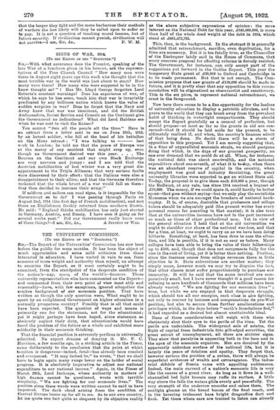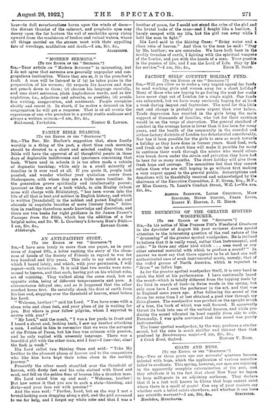THE UNIVERSil 1( COMMISSION. [To UM EDITOR OF TELE "
SPECTATOR."3 Sre,—The Report of the Universities' Commission has now been before the public for some months. It has been the object of much appreciation and some mild criticism from those Interested in education. I have waited in vain to see, from someone of more weight and authority than myself, an attempt to examine the Report, as it most certainly ought to be examined, from the standpoint of the desperate condition of the nation's—nay, more, of the world's—finances. Those university representatives who have commented on the Report— and commented from their own point of view most ably and reasonably—have, with few exceptions, ignored altogether the sombre background of our economic position. They have written as though the only question were, What ought to be spent by an enlightened Government on higher education in a normally prosperous country? Possibly that is all that could
have been expected. The question of ways and means is primarily one for the statesman, not for the educationist; yet it might perhaps have been hoped, since statesmen so obviously neglect their duty, that educationists would have faced the problem of the future as a whole and exhibited more solidarity in their economic thinking.
That the financial position is extremely perilous is universally
admitted. No expert dreams of denying it. Mr. F. C. Harrison, a few months ago, in a striking article in the Times, came deliberately to the conclusion that the point at which taxation is dangerous—indeed, fatal—has already been reached and overpassed. "It may indeed be," he wrote, "that we shall have to begin again many rungs lower on the ladder of social progress. It is absolutely imperative to adjust our national expenditure to our national income." Again, in the Times of March 29th, Lord Inchcape, whose authority in matters of high finance cannot be questioned, wrote with terrible
"We are fighting for our economic lives." The position since these words were written cannot be said to have improved. The dark cloud arising from the condition of Central Europe looms up for all to see. As to our own country, let me quote one fact quite as eloquent by its objective reality
as the above subjective expressions of opinion : the mere Interest on the National Debt for this year, 4345,000,000, is more than half of the whole dead weight of the debt in 1914, which stood at 4661,473,765.
This, then, is the background. In the abstract It Is generally admitted that retrenchment, sacrifice, even deprivation, for a time are necessary. But it is too fatally true, as the Chancellor of the Exchequer lately said in the House of Commons, that every concrete proposal for effecting reforms is fiercely resisted. The Government, for instance, can only accept part of the suggestions put forward in the Geddes Report. This year the temporary State grant of 430,000 to Oxford and Cambridge is to be made permanent. But that is not enough. The Com- mission proposes that new grants of £110,000 should be made in future, and it is pretty clear that any opposition to this recom- mendation will be stigmatized as obscurantist and reactionary. This is the set piece, to represent national retrenchment, we erect in the foreground.
Now here there seems to be a fine opportunity for the leaders of university education to display a patriotic altruism, and to prove to the world that they can break away from the prevalent habit of thinking in watertight compartments. They should accept the Report gratefully as a counsel of perfection, but should propose—at least so far as the grants in aid are con- cerned—that it should be laid aside for the present, to be ultimately realized if, and when, the country's finances admit of that being done. No doubt there will be a storm of opposition to this proposal. Yet I am merely suggesting that, in a time of unparalleled economic strain, we should postpone doing that which, in the days of our greatest prosperity, no one ever dreamed that we could do at all. When, for instance, the national debt was about one-twelfth, and the national expenditure about one-seventh, of what it is to-day, when there was an abundant reserve of capital in the country, when employment was good and industry flourishing, the great university libraries were expected to get on without State aid. To-day, the proposal is to give them each £10,000 a year, though the Bodleian, at any rate, has since 1914 received a bequest of 450,000. The money, if we could spare it, could hardly be better spent—that goes without saying—but we only play the socialistic: Maecenas when we are amongst the breakers of national bank- ruptcy. It is, of course, desirable that professors and college tutors should be adequately paid (the present writer has every, personal reason for assenting to that maxim); it is also true that at the universities incomes have not in the past increased so much as those of other professional men. Yet in view of the general situation I hold that at the old universities we ought to shoulder our share of the national war-loss, and that for a time, at least, we ought to carry on as we have been doing hitherto. Something, at least, has been done to ease the situa- tion, and life is possible, if it is not so easy as before. Many colleges have been able to bring the value of their fellowships up to £300, and, though that does not compensate fully for the rise in the cost of living, yet it is better than nothing. Further, since the increase comes from college revenues there is little objection to it. State subventions are another matter; they simply mean, however much we may try to disguise the fact, that other classes must suffer proportionately to purchase our Immunity. It will be said that the sums involved are com- paratively small, but I have never thought it a good reason for refusing to save hundreds of thousands that millions have been already wasted. "We are fighting for our economic lives" ; true, but while we are engaged in that desperate struggle, which should tax all our energies, each class is also fighting, not only to recover by bonuses and compensations its pre-War position, but also to secure those further ameliorations and privileges which, in the days before "earth's foundations fled," it had regarded as a desired but almost unattainable ideal.
None of these considerations will weigh with those who obstinately shut their eyes to the perils of the time. Yet the perils are undeniable. The widespread sale of estates, the flight of capital from industrials into gilt-edged securities, the great extent of unemployment, all these are sinister signs. They show that paralysis is appearing both in the base and in the apex of the economic organism. Men are deceived by the apparently unbroken surface of the national life, but it is largely the peace of fatalism and apathy. They forget that, however serious the position of a nation, there will always be superficial evidences of wealth and extravagance. The indus- trial debacle of Russia came with appalling suddenness. Indeed, the main current of a nation's economic: life is very like the course of a great river. As long as it flows in a well- channelled bed light breezes may ruffle its surface. A little way above the falls the waters glide evenly and peacefully. The very strength of the undertow smooths and calms them. The sunlight gleams on the broad bosom of the final reach, and in the hovering iridescent haze bright dragonflies dart and flash. Yet those whose ears are trained to listen can already
hear—in dull reverberations borne upon the winds of doom— the distant thunder of the cataract, and prophetic eyes may descry upon the far horizon the veil of smokelike spray rising upward from the maelstrom of broken and ruined waters, where all things carried on the stream meet with their appalling fate of wreckage, mutilation and death.—I am, Sir, &c., ACADEMIC/US.



































 Previous page
Previous page